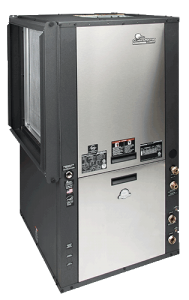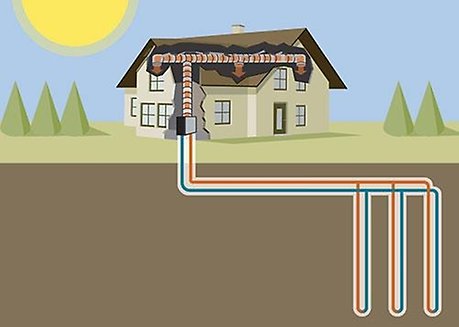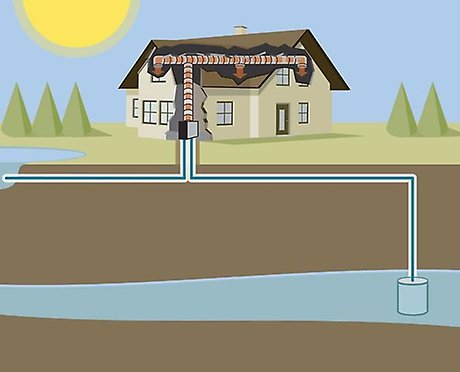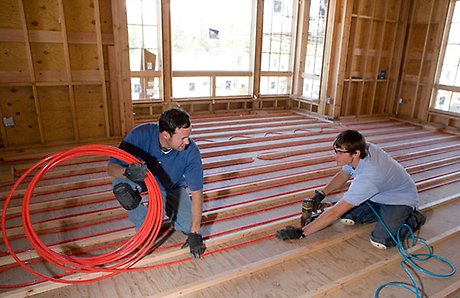Frequently Asked Questions
What is a geothermal heat pump?
A geothermal or “ground-source” heat pump is an electrically-powered device that uses the natural heat storage ability of the earth and/or the earth’s groundwater to heat and cool your home or business at very high efficiencies.

How does a geothermal pump work?
Geothermal heat pumps use the constant temperature of the earth as the exchange medium instead of the outside temperature (like traditional systems). Like any type of heat pump, geothermal heat pumps can heat and cool and if supported supply the home with hot water. Using refrigeration, the geothermal heat pump removes heat energy stored in the earth and transfers it to the home.
How is heat transferred between the earth and the home?
The earth can absorb and store heat energy. To use that stored geothermal energy, heat is extracted from the earth through a liquid medium (water or an anti-freeze solution) circulated in the ground via open or closed earth loops and is transferred to the heat pump heat exchanger. There, the heat is used to heat your home. In the summer, the process is reversed, and indoor heat is extracted from your home and transferred to the earth through the liquid circulating in the loops underground.
Do I need separate geothermal ground loops for heating and cooling?
No, the same loop works for both. When changing from heating to cooling, or vise versa, the flow of heat is reversed by a mechanism inside the unit.
EER (Energy Efficiency Ratio)
The ratio of cooling provided by a geothermal heat pump to the energy it consumes. Higher EER equals higher efficiency.
COP (Coefficient of Performance)
The ratio of heating provided by a heat pump to the energy it consumes. Higher COP equals higher efficiency.
Compressor
The compressor moves the refrigerant through the geothermal heat pump to facilitate heat transfer between the air in your home and the heat pump.
Water Flow Control
In order for a geothermal heating and cooling system to exchange heat via its underground loop, water must be continuously circulated between the ground and the heat pump. This is the job of the water flow control.
vFlow® Internal Variable-Speed Water Flow Control
vFlow® intelligently varies water flow to minimize pump energy consumption.
External Fixed-Speed Water Flow Control
This is the traditional method of water flow control in which fixed (single-speed) pumps are housed outside of the heat pump. This method of water flow control requires a bit more space to install and is not as efficient as vFlow®.

Pond/Lake Geothermal Loop
Indoor Fan
The indoor fan is responsible for circulating conditioned air throughout a home’s air conditioning ductwork and is housed inside of the heat pump. Heat pumps are currently offered with 2 types of indoor fans:
Variable Speed Indoor Fan
Variable-speed indoor fan intelligently varies fan speed to minimize energy consumption.
Single Speed Indoor Fan
The single speed indoor fan operates at only one speed. It gets the job done but is not as energy efficient as the variable speed fan.
Electronic Controls
The electronic controls are the brains of a geothermal heat pump. They control all aspects of unit operation and receive and translate information from the thermostat.
iGate® Communicating Controls
iGate® Communicating Controls allow for 2-way communication between the thermostat and heat pump and analyzes the status of sensors and other 2-way communicating components to determine how best to operate your system for optimal comfort, efficiency, and long-term reliability
Non-Communicating Controls
These are traditional electronic controls that do not support 2-way communication. These controls work but are not able to control geothermal system operation as efficiently as iGate® communicating controls.

Example of an open-loop geothermal system
Can a geothermal heat pump also heat water for my home?
Yes, using a hot water generator (HWG), some types of geothermal heat pumps can save you up to 50% on your water-heating bill by pre-heating tank water. The HWG is a factory-installed option.
Can a geothermal heat pump be added to my fossil fuel (gas, oil, propane) furnace?
Split systems can easily be added to existing furnaces for those wishing to have a dual-fuel system. Use the heat pump as the main heating source and a furnace as a supplement in extremely cold weather if additional heat is needed.
I have ductwork, but will it work with this system?
In most circumstances, yes. Your installing contractor should be able to determine ductwork requirements and any minor modifications, if needed.
What does a geothermal system cost?
A geothermal system for the typical home will cost more than if you bought a conventional central air conditioning system. But you wouldn’t be comparing “apples to apples.” To get an accurate comparison of costs you need to consider the following:
- Payback, or how long it takes to recover the difference in costs between the two systems using energy savings. Payback for most geothermal heat pump systems runs three to five years.
- State and local tax credits / incentives will significantly reduce the upfront cost of installing a geothermal system.
- Energy efficiency of the two systems. To get an accurate picture, make sure efficiency claims are substantiated. Your lifestyle and how well your home is insulated affect how economical a system will be, too.
- Total operating savings from heating, cooling and domestic hot water must be combined to get an accurate picture of total energy savings.
- Energy costs and availability, both present and future.
- Maintenance costs and system reliability.
- System lifespan.
- Take a look at our geothermal savings calculator to see how much geothermal can save you on your monthly energy bills.
Can I use a heat pump for radiant/hydronic floor heating (warm floors)?
Yes, water-to-water heat pumps heat water instead of air. The principle is the same as far as loop piping is concerned. Warm water is circulated through the floor to heat the home. Our Tranquility Water-to-Water Series of heat pumps are excellent choices to use for radiant or hydronic heating.

Where do I find out my unit information? Model number and Serial number?
Unit information can be found on the name plate at the front panel of unit.
ClimateMaster, Inc
7300 SW 44th St
Oklahoma City, OK 73179
800.299.9747
© ClimateMaster, Inc. All rights reserved 2024

